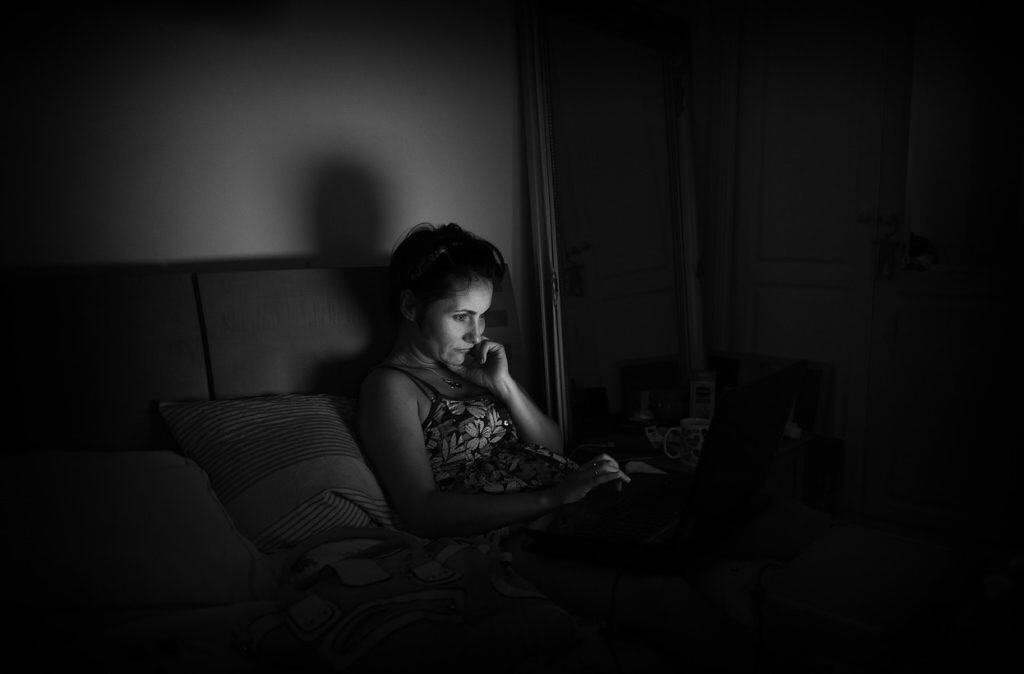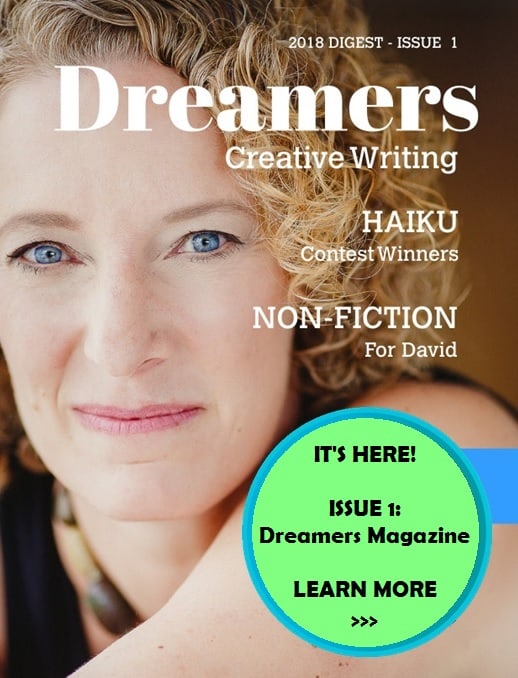Restive and Uprising
– Creative Non-fiction by Marina Hatsopoulos – August 5, 2018 –
“The most regretful people on earth are those who felt the call to creative work, who felt their own creative power restive and uprising, and gave to it neither power nor time.” ~Mary Oliver
 I slip through the conference hall as swiftly as my pumps allow, with a big smile and a wave to my venture capitalist buddies in back. After a few entrepreneurs approach to shake my hand, a tall guy in glasses corners me to pitch his startup. He’s wearing a suit—rookie mistake—and says he’ll sell his business in 18 months, probably to Google, for at least 20x. He has no clue how long it takes to build a technology business, and shows none of the commitment needed to handle the bumps in the road. Startups require monumental effort, which is why, in exhaustion, we sold our 3D printing business. Then, after the boredom kicked in, I started angel investing in other tech startups while pursuing my lifelong dream of writing and publishing a novel. This guy won’t stop talking, so I check the time, wishing it were as easy to delete a conversation in person as it is in email.
I slip through the conference hall as swiftly as my pumps allow, with a big smile and a wave to my venture capitalist buddies in back. After a few entrepreneurs approach to shake my hand, a tall guy in glasses corners me to pitch his startup. He’s wearing a suit—rookie mistake—and says he’ll sell his business in 18 months, probably to Google, for at least 20x. He has no clue how long it takes to build a technology business, and shows none of the commitment needed to handle the bumps in the road. Startups require monumental effort, which is why, in exhaustion, we sold our 3D printing business. Then, after the boredom kicked in, I started angel investing in other tech startups while pursuing my lifelong dream of writing and publishing a novel. This guy won’t stop talking, so I check the time, wishing it were as easy to delete a conversation in person as it is in email.
“I’m not interested,” I say. I’ve mastered those words: clear and concise, with no sliver of an opening for follow-up. It’s not that I enjoy snuffing the flame of these entrepreneurs’ egos. It’s just that I’m not doing anyone any favors by being unclear. He accepts my words and shakes my hand to leave.
During the conference, I sit in the back row sipping an iced hibiscus tea while I watch the panelists. The woman on stage explains her early failures as if it was all part of the plan. The guy beside her interrupts to contradict her. He’s had an exit—sold his startup to Microsoft last year—so he thinks he knows something, but I wonder if she hasn’t learned more.
I check my overflowing inbox on my phone; the pitches multiply like lice if I don’t pick them off snappy. It’s all about efficiency, and there’s no benefit to ambiguity, so I refine my rejection to be more succinct, and I rule out social apps, which frees me to delete a swath of inquiries. Only a few are spared, left to marinate in my inbox until I do some research.
I like to invest in hardware startups, but searching for investments is like house-hunting—I may say I want a Cape, but then fall in love with a Colonial. I like big ideas with intellectual property: patents, know-how and trade secrets. The team is critical because there are always problems, and smart people can figure their way out while stupid people don’t have a chance. At the end of the day, after all the analysis, investing requires some blind faith and gut feel because the risks are high and nothing is yet proven. In short, I have to get it.
Hidden in my inbox is an email from the literary agent who had shown interest in my novel. The appearance of her name acts as an instant antidote to all the annoyances scraping at my well-being. I love referring to “my agent,” even though I always clarify, “Well, she hasn’t actually committed yet, but she’s interested.” After so many rejections, I finally found this one agent who liked my story about a woman leading a technology startup. This professional reader thinks my writing is worthy. She doesn’t think business is de-facto boring. She gets it.
I almost spill my iced tea in my haste to put it down. I’ve been waiting for weeks for her comments on my latest revisions. The truth is, I spend much more time writing these days than doing anything else, so I need some feedback. I’m not going to be able to read it on my phone, so I pick up my laptop and head to the lobby, where the sun paints shadow stripes across the walls. I open the email, but it’s not pages of analysis like her last one. The whole email is just a couple of lines, with no attachment. I read it again. It’s a rejection. A kick in my face. Just like that, it’s all over. She’s not interested. My stomach tightens as I recognize the diminishment of my self-worth.
There’s nothing for me to do; her email leaves no possibility for follow-up. I try to devise a plan, but there’s no planning after you’ve fallen off the edge of a flat world. I didn’t realize until now how important this novel is to me. It matters. Maybe I’m like one of those entrepreneurs who pitches a losing idea, moving their way down the hierarchy of investors until the feedback is less harsh, and he starts to believe he’s getting closer. He has no idea how far he is from having a sound business, how great an impossibility entrepreneurship is for him—now and forever.
 Getting published shouldn’t be this difficult. With millions of books on Amazon, I only need one of them to be mine. The hot air constricts my breathing. My longing for readers is not about the recognition, but the power of shaping another person’s perspective. My act of creation only has value if it’s experienced by someone else. Maybe I should drop the dream so it stops dropping me. I’ve wasted ten years, struggling alone at my desk into the middle of every night, searching for words, sending my work out to the world over and over, and the only message back from the world is, “Not Good Enough.” I’m impotent. I spit hair out of my mouth. I should stick with investing, where I have the puppet-king’s power to be doing the rejecting.
Getting published shouldn’t be this difficult. With millions of books on Amazon, I only need one of them to be mine. The hot air constricts my breathing. My longing for readers is not about the recognition, but the power of shaping another person’s perspective. My act of creation only has value if it’s experienced by someone else. Maybe I should drop the dream so it stops dropping me. I’ve wasted ten years, struggling alone at my desk into the middle of every night, searching for words, sending my work out to the world over and over, and the only message back from the world is, “Not Good Enough.” I’m impotent. I spit hair out of my mouth. I should stick with investing, where I have the puppet-king’s power to be doing the rejecting.
To be honest, I’m not sure this one rejection went down just this way, but, having received twenty or thirty rejections from agents for this novel, I have no idea. I think back to all the times I’ve been judged unworthy. I never found out why my best friends in fourth grade excluded me for three days from our inner circle. In high school, I wasn’t surprised when I was dumped by my older boyfriend after he left for college, but I still found myself despondent, sitting in the tub while the hot shower washed away my tears. Harvard’s waitlist felt like a slow death, so I went to Brown instead, to pre-empt the denial. After graduate school, I had to create my own job by starting a business because my Engineering degree wasn’t good enough to land a management position. I wonder if there’s a pattern to all these rejections. I remind myself that my college boyfriend was a better fit, Brown was beyond all expectation, and my entrepreneurial journey was life-changing. But that doesn’t change the fact that my novel was rejected.
I need to get out of the conference before anyone comes over to talk to me. Unlike writing conferences, where I am just another nobody in a sea of women, at this conference I know half the people, and my ego usually appreciates the respect. How ironic that I only get validation from the startup world, while my time is focused on writing. I wipe my nose and heave myself up, but before I escape, the entrepreneur in the glasses returns. He’s taken off his jacket and tie, which he’s holding in his arms. He’s much taller than I am, which feels incongruous with our power dynamics. He stands with his legs far apart to keep from stooping over.
“You guys were pioneers,” he says. “It took the mass media—what—like fifteen years to discover 3D printing. Why’d you sell it?”
“I was burned out.”
Maybe we shouldn’t have sold the business. I was somebody, and now what am I? I think about the agent’s email. She suggested changing the title. Her email was constructive and kind, but it was still a rejection.
This guy’s eyes light up when he explains his technology, which is a wearable device for all sorts of medical measurements. He’s not bad-looking; could be Superman behind those Clark Kent glasses. His startup is risky and he hasn’t even built a prototype. I prepare an explanation for why I won’t invest, but I try to think of words to soften the message.
I remember now that he’s emailed me several times. I want to reward him for his tenacity, tracking me down, so instead of walking away, I articulate the problems I see with his business model and the difficulties of getting consumer attention. He listens and takes notes, as if my rejection was not the end but a new beginning.
“Everything takes a lot longer than you think,” I say. “We had to rework the pitch, over and over. Our sales took over a year to close, which was scary; we really needed the cash.”
“Why didn’t you raise more money?”
“We got turned down by every VC in town and thought we’d have to fold. Dark days, but we trudged through until we found a speckle of light,” I say. I feel my face soften. I don’t see a point in tearing him down. “There’s no choice. You push on.”
“It’s hard, but I love it,” he smiles.
If he loves what he does, who am I to say he should quit? And I love writing. It’s about creating something from a blank slate. I can’t help but think of new ideas for my novel’s title. It needs to relate to business, but imply the narrator’s change in perspective.
“Any advice?” he asks. It’s code for asking if I want to invest.
“Stick with it. We never gave up when people said we had a crappy product.”
The protagonist in my novel would never give up either. I’m going to write back to ask the agent for more feedback.
He foists his card on me. This guy is fearless. All he sees is possibility. He could be the next great CEO building the next great product. He’s exuding hope. I love that feeling and I want it back.
“To be honest, I’m not sure you’re targeting the right market with this technology.”
We talk it over for a bit, and he nods.
“So we might have to pivot. That’s okay. I’ll talk to some customers,” he says. “I really appreciate the advice.”
“You’re the one making it happen,” I say. He’s listening to me, but he doesn’t seem to understand what I’m saying. “It’s all on you,” I add.
“Can we chat over coffee next week?” he asks, eyes twinkling.
It’s the reminder of that forgotten optimism that cheers me. As we approach the exit, a Guster song about castaways finding land falls into my brain, and the lyrics assure me that everything’s going to be okay. The feeling is inside me now.
“I know an expert in the space,” I say. “I can help you out. I’ll email you.”
But now I need to get home to sit in quiet with my computer, sift through the database of agents, and find five new names. After I re-work my manuscript, I’m going to send it out again. Finding an agent is a game of numbers. You have to kiss a lot of frogs, but it’s like falling in love: you only need one.
 Some entrepreneurs interrupt us to shake my hand, as if I have some wisdom I can impart to them through my fingers.
Some entrepreneurs interrupt us to shake my hand, as if I have some wisdom I can impart to them through my fingers.
After they leave, Clark Kent says, “It must be nice to be you.”
“I’d rather be you.”
“Yeah?” he asks, apparently unsure if I’m joking. “You don’t like holding the cards?”
“I hold nothing. Even if I invest, I’m just enabling you. My support is insignificant after a customer is consuming your product. You’re the one with the potential to make something—to make the world different.”
Before he responds, an idea for a title flashes in my mind, so I flip over his business card to the empty backside. My rollerball releases a smooth flow of blue ink on the white surface, and I write, “The Pivot.” That’s when I feel my power.
–
About the Author – Marina Hatsopoulos
Marina Hatsopoulos has writing published or forthcoming in Antioch Review, Bellevue Literary, Crab Orchard Review, F(r)iction by Tethered by Letters, Pooled Ink: NCW Contest Winners, HCE Review, Poetry and Business, and Prole Books. Her work has been winner or finalist in the F(r)iction Short Story Contest, the PNWA literary contest, the Jack Dyer Fiction Prize, the Prolitzer Prize and the Glimmer Train Short Story Award for new writers. Marina Hatsopoulos was Co-Founder/CEO of Z Corporation, an early leader in 3D printing out of MIT.
*An earlier version of “Restive and Uprising” by Marina Hatsopoulos was published in Poetry and Business.
–
Did you like this non-fiction story by Marina Hatsopoulos? Then you might also like:
Moon Window
Writing Dreams, Rewriting Life
Dismantler

